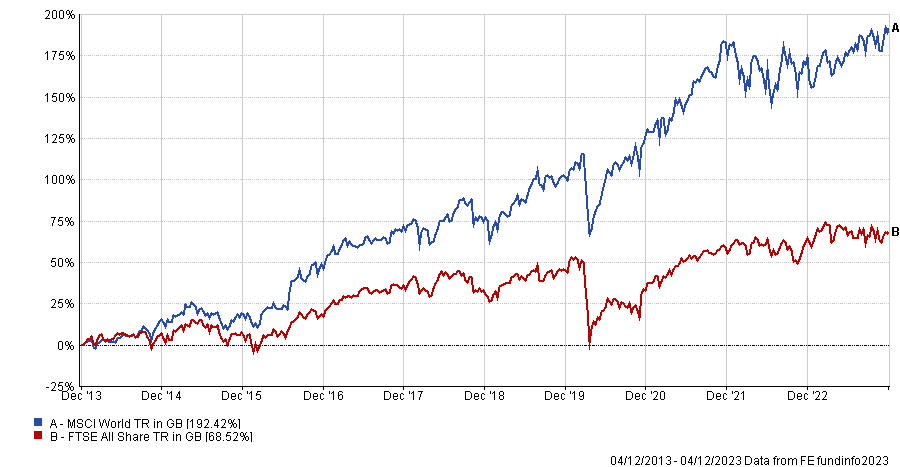UK equities and tech names are expected to top the performance charts next year, according to a survey by the Association of Investment Companies (AIC), which polled the 343 members of its trust universe.
Around a quarter (26%) of those that responded said tech will top the charts, while industrials (19%), healthcare (15%) and energy (15%) are all expected to do well.
In terms of regions, some 44% expect the UK to lead the way next year, followed by the US (15%) and Japan (11%). Smaller companies should top their large-cap peers having underperformed in recent years, while just 11% think bonds will be the best place savers can put their cash.
On the economics front, 78% of managers believe interest rates have peaked, although more than half (59%) state the Bank of England base rate will remain above 4% by the end of the year. This is because inflation is likely to fall – 93% believe price rises will continue to slow.
The biggest potential tailwind is falling interest rates, 30% of managers said, while 15% said it was cooling inflation and 22% suggested the opportunities to buy cheap companies as the main reason for optimism in 2024.
However, it may not all be plain sailing. The biggest risk to investors is the potential for a recession, according to 26% of respondents.
Below, Trustnet rounds up the views from managers in various asset classes.
Global equities
Andrew Bell, manager of Witan Investment Trust, said the best opportunities next year will come from Europe and the emerging markets as investors move away from the US.
“We are troubled by the risk that the outcome of the US election could be a withdrawal of the US from international affairs, at a time of global tensions and threats to peace and liberty,” he said.
“Although this is not specifically an economic risk, markets are moved by changing risk premia as well as underlying fundamentals and appeasing, rather than resisting, international aggression would be a negative factor.”
Alex Wright, manager of the Fidelity Special Values trust, agreed, stating that the biggest risk next year is the potential for a US recession.
“While there is increasing talk of a soft landing, there is considerable historical evidence on the impact of monetary tightening to keep us cautious on company prospects in the near term,” he said.
The UK
Simon Gergel, manager of Merchants Trust, said UK stocks were on near 20-year low valuations with the dispersion between the prices of stocks “extremely high”.
“Historically, this has been a good time to invest because the returns you get from investing are often linked to the price you pay for the assets, and currently these prices are very low,” he said.
Indeed, the FTSE All Share has lagged behind the MSCI World index over one, three, five and 10 years, making around a third of the returns of the global index over a decade.
Total return of indices over 10yrs

Source: FE Analytics
Wright noted the valuation of the UK market provides investors “a strong margin of safety” from the risk of a US recession, a sentiment echoed by Iain Pyle, manager of Shires Income.
“In contrast to some markets, we remain very optimistic on the UK given the low valuations for equities and the likelihood that any downturn will be short and shallow and is already priced in,” he said.
Here, some managers were more positive on the lower end of the market capitalisation spectrum. Pyle noted that UK mid-caps are “highly undervalued” while Ken Wotton, manager of Strategic Equity Capital, suggested smaller companies are “exceptional value”.
Emerging markets
Emerging markets have failed to live up to investors’ expectations, particularly in China where a great Covid rebound underwhelmed.
However, Nick Price, manager of Fidelity Emerging Markets, said valuations are at odds with the much improved economics in the region – which differ from their developed peers.
“Nonetheless, the discount at which emerging markets are trading is at odds with the improving fundamental picture in many cases. This is especially the case given that inflation appears to have peaked in many economies, interest rates have started to come down and we are seeing many companies – particularly in China – return capital to shareholders,” he said.
“We see lower levels of debt-to-GDP in many emerging market countries, particularly relative to the US, where the near-breaching of the debt ceiling brought the country’s unsustainably high levels of debt into sharp relief.”
Real estate and infrastructure
Real estate has had a tough period with open-ended funds closing on the back of investor redemptions, but Jason Baggaley, manager of abrdn Property Income, said next year could be more positive for the asset class “with interest rates beginning to decline and the cost of debt falling”.
Infrastructure has also struggled under the recent interest rate environment, but Jean-Hugues de Lamaze, manager of Ecofin Global Utilities and Infrastructure, said listed infrastructure, particularly utilities exposed to the energy transition, are trading at record lows.





